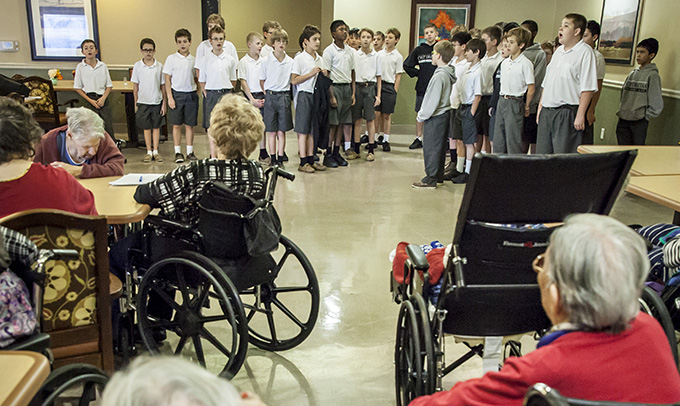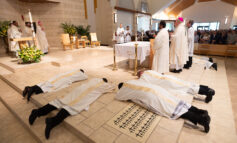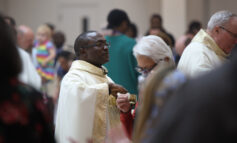
Fifth-grade students from Cistercian Preparatory School sing Christmas carols at the Northgate Plaza nursing home in Irving on Dec. 11. (RON HEFLIN/Special Contributor)
By Father Thomas Esposito
Special to The Texas Catholic
When St. Augustine wrote that “whoever sings prays twice,” he was mindful of the essential role music has always played in the life of the church. (The quote is actually “Whoever sings well prays twice,” but with the Year of Mercy underway, ‘tis the season to pardon the vocally challenged among us!) The psalms, which at their core are hymns whose melodies have been lost, were sung in the Jerusalem Temple long before the angel chanted the first Christmas tidings to the shepherds (Luke 2:8-14).
Today, mingled with holly jolly jingles about reindeer and snowmen and chestnuts roasting are hymns which deserve to be the object of our quiet prayer. If a single theme uniting the various carols is difficult to detect, one common sentiment discernible in most of these venerable songs is, perhaps surprisingly, a sober wonder. That the cause of our joy should be the birth of a child whose coming was foretold is marvelous enough; but that this child entered our world in order to die, and thus to grant us renewed life, should rouse us to awed silence once our singing is done.
Just as the book of psalms highlights the whole spectrum of human emotions, so too do Christmas carols narrate the varied responses of the heart to the grave beauty of the Christmas mystery. Some of our most-beloved carols, such as “The First Noël” and “Angels We Have Heard On High,” were first heard in liturgical settings, and are rightly considered modern psalms of joy. Whether quoting the infancy narratives (see Matthew 2:1-14; Luke 2:1-20) or alluding to other biblical verses, these carols offer a beautiful synthesis of Christian theology. The music accompanying these Scripture-lyrics guides the Christian heart upwards in gratitude to God. While many of these songs employ upbeat melodies which generate a palpable fervor as we welcome the Christ child, an equal number of carols features a calm melody, channeling our emotions to a level of prayerful amazement as we ponder the ultimate proof of God’s love for us.
St. Alphonsus Liguori, a doctor of the church, wrote more than 100 Christmas carols in his native Italian tongue. The most famous of these, a simple tune entitled “Tu scendi dalle stelle” (“You descended from the stars”), presents the wondrous sacrifice God makes to be radically near to us in the person of Jesus: “You leave the divine breast of your Father / to come tremble on this hay.” But the truly admirable thought for St. Alphonsus is the fact that the glorious creator of the world would willingly experience such humiliation, both at his birth and later on the cross for us…and for him personally: “How much it cost you to love me!” and “O my Jesus, why suffer so for love of me?”
The fundamental paradox of the Christian faith is on full display in these fascinating meditations on the manger scene: the God whom the heavens cannot contain chooses to enter our world as a helpless baby. This paradox, already perceived by the angels, shepherds and Magi, and fully revealed only at the hour of the Lord’s crucifixion, is expressed solemnly in the second verse of “What Child is This”: “Why lies he in such mean estate / Where ox and ass are feeding? / Good Christians, fear, for sinners here / The silent word is pleading. / Nails, spears shall pierce him through, / The cross he bore for me, for you. / Hail, hail the word made flesh, / the babe, the son of Mary.”
As we adore the Christ child, “the silent word” still unspeaking and not yet suffering the passion for which he came to dwell among us, let us praise him this holy season with equal amounts of faithful carols and prayerful silence.
Father Thomas Esposito, O.Cist., is a theologian and monk at the Cistercian Abbey of Our Lady of Dallas in Irving. His column will appear occasionally in The Texas Catholic.



